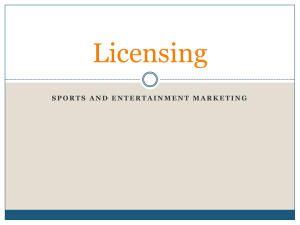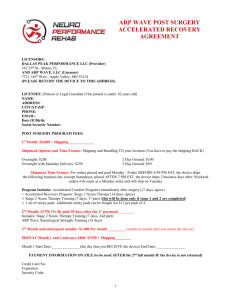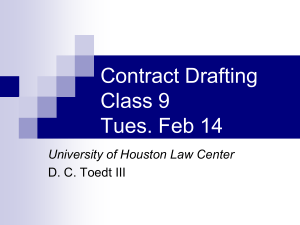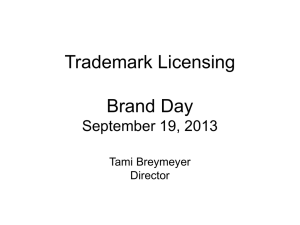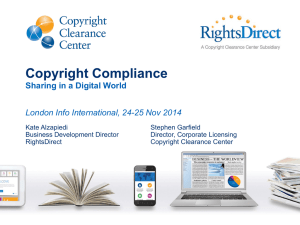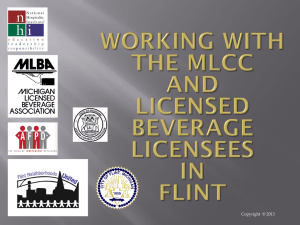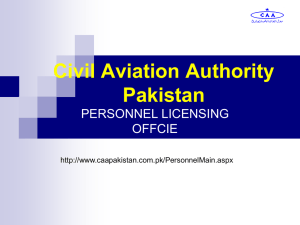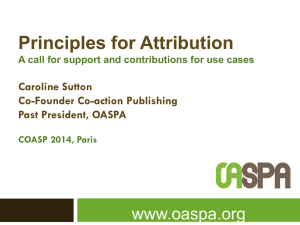First Time Licensee –Basic Training
advertisement
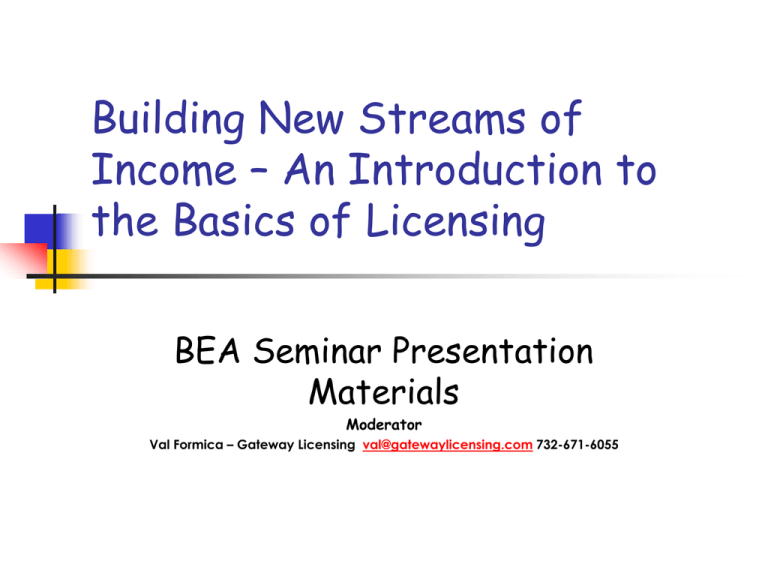
Building New Streams of Income – An Introduction to the Basics of Licensing BEA Seminar Presentation Materials Moderator Val Formica – Gateway Licensing val@gatewaylicensing.com 732-671-6055 First Time Licensee – Licensing defined Some license examples Licensing language Licensee/Licensor relationship What types of licenses are right for your company How to prepare your company for entry Tips on how to secure your first license What is licensing? Licensing is “renting” the use of a trademark or copyright, that is commonly called “the Property” which can be a name, likeness, logo, graphic artwork, saying, signature or any combination of these elements in conjunction with your publishing product. These rights cover a specific time and geography for agreed to cash payments and marketing efforts License types Art Brand Name/ Trademarks Celebrity Character/ Entertainment Collegiate Estates Fashion/Designers Music Non Profit Publishing Sports Toys/games More Licensor/Licensee Licensor/Licensee defined Licensor is the property owner of the trademark or copyright you want to license from, for your product. Licensees are usually manufacturers, retailers or service providers that secure the rights from the licensor Licensing Agreement This is a contractual agreement between you, the licensee, and the licensor, the licensed property owner (or his agent) . This agreement defines the specific business terms and mutual responsibilities of the licensor and licensee in managing and marketing the licensed trademark or copyright. These terms and responsibilities are defined on the following pages. Licensee Responsibilities Guarantee: This is the minimum royalty dollar amount you agree to generate for the licensor. The purpose of this is to insure that your company is committed to the full development of the property and insure that the licensor generates a minimum level of revenue for their investment in the property. Royalties earned are applied against the guarantee, if by the end of the term of the agreement you earn and pay royalties equal or over the guarantee you have met or exceeded the guarantee. If you do not exceed the guarantee, you are liable to pay the difference; this is commonly called a shortfall. Advance: This is your down payment against the guarantee. Any future royalties your company earns are deducted from the advance. When you exceed the advance you pay additional dollars at the royalty percentage rate towards the guarantee. Advances are paid on signing of the agreement, some licensors require additional advances during the term of the agreement. Royalty Rate: The percentage (some times piece) rate the licensee must pay the licensor based on the licensee’s sales volume This may be paid monthly or quarterly and is accompanied by royalty report. Publishing Royalty Rates Royalty rates are based on many variables and are generally negotiable if you can justify a different rate Built into the price that the publisher charges their customers Publishers (as property owners) charge, on average, 8.7% Publishers as licensees pay, on average , 9.8% Rates can range from 2 to 15% and vary by type - Books: 6 to 12% - Newspapers/Magazines 3 to 12% - Comic Books/Strips 5 to 15% Royalty rate source: The Licensing Letter Licensee Responsibilities Exclusive vs. Non-Exclusive When a licensee is granted an exclusive license for their product, they will be the only resource permitted to market their product or service using the licensors trademark/copyright. A Non exclusive license means licensor may grant the same rights to other companies. Territories The geographic region you will be permitted to market your product using the licensed trademark. Example: USA, all states within the US, but not areas outside the US. Distribution Distribution refers to the type of outlets you usually sell your products through. If you sell to Mass Market, Food and Drug retailers this is the area you will be granted Product/Service This is the product or service that you will be permitted to apply the licensed tm or copyright and market within the territory Ship & marketing dates Specific milestones the licensor requires you to begin marketing and shipping the licensed product. Licensee Responsibilities Product development A key responsibility of the licensee is the physical design of the product line or service incorporating the licensed property in an appropriate way that is in keeping with the trademark or copyright and acceptable to the licensor. Most licensors have specific guidelines that licensees must follow. Licensing agreements clearly list in the articles section what products or services the licensee can make and market. Failure to make and actively market the listed articles can result in withdrawal of those articles not produced or in extreme cases cancellation of the licensee’s agreement. Licensee Responsibilities Approvals After designing the product licensee must obtain licensors approval to sell the licensed article. Failure to obtain proper approvals could result in the lose of your licensing rights. Marketing plans/Selling Many licensors require licensees to develop and execute a specific plan to market the licensed articles incorporating their trademark. It’s the licensee’s responsibility to sell the licensed product through their normal distribution system. Product Liability Licensee is required to insure its products meet all safety standards and carry substantial liability insurance, current requirements range from one million to ten Million dollars Termination/Sell-off Agreements can be terminated naturally at the end of a term or licensors can terminate for licensee’s failure to meet its contractual obligations either financial or performance as outlined in prior slides. If an agreement expires licensee maybe permitted to sell off any excess inventory for a specific period of time. Licensor Responsibilities Style Guide Licensors are required to provide licensees with design direction. This can many forms including verbal, written and visual. The most commonly used form is a prepared style guide that provides licensees with specific written and visual materials. Approvals After licensee develops its licensed product line and submits to licensor, the licensor must approve or disapprove the submitted designs in a reasonable period of time. If approved licensee may begin selling the articles, if disapproved the licensee must re design and re submit for approval. Trademark Protection This is a key requirement and language must cover this in every agreement. It’s the licensors responsibility to make sure no one infringes on your licensed tm and legally fight any one that attempts to market a similar or the same tm you are licensed. Advertising & Promotion The licensor is responsible for actively promoting there property to the consuming public. This is the major reason why most companies employ the use of licensing. Retail Development In recent years many licensors have supported licensors on the retail front by establishing broad based in-store programs. These programs are helpful for licensees however its still the licensees responsibility to market and sell-in his licensed product. What type of licensing is right for your company? What are your corporate objectives Are you trying to raise your overall corporate consumer/trade awareness, temporally give your brand name product a sales boost, build the sales of a particular segment of your business, etc. Examine your product line/service Determine what types of licensed trademarks or copyrights are appropriate for your product or service. Just because the trademark is well known or the character license is exciting kids it still needs to be appropriate for your product line. What is your distribution Some trademarks can transcend all levels of distribution, Department stores, Mass, Mail order, internet, TV others cannot. Who is your customer Knowing who your customer is for your product line is always important however when adding a license you need to make sure that your customer will view the license as appropriate Securing licenses - Preparation Staffing Licensing requires individuals that have a mix of skills. The best individuals for this position usually have the following skill sets: vision, creativity, marketing and sales background, organization, and an ability to represent the company in the licensing community. What a licensor seeks from a licensee Before attempting to secure a license from a licensor you should determine what the licensor is seeking in a licensee for a specific license. There are a number of factors that affect this and every licensor has a different set of requirements. In general terms licensors seek licensees that are already successful in the business the licensee is seeking a license for. The licensee should have an established quality, marketable product line, a strong customer base, adequate infrastructure and the financial resources to support the licensors licensing program. Additional resource information LIMA, Licensing Industry Merchandisers Association – www.licensing.org Advanstar Communications, lic@advanstar.com, www.licensingshow.com EPM Communications, www.epmcom.com Kidscreen Magazine, www.kidscreen.com License! Magazine, www.licensemag.com Royalties, andy.anbmedia@gmail.com The Licensing Book, www.adventurepub.com Licensing Royalty Rates, Battersby & Grimes, www.aspenpublishers.com
